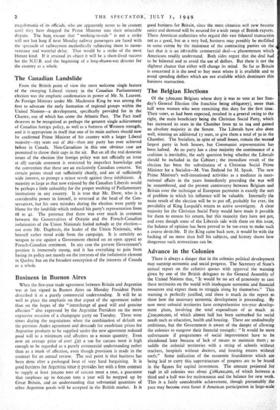The Belgian Elections
Of the 5,600,000 Belgians whose duty it was to vote at last Sun- day's General Election (the franchise being obligatory), more than half were women who were exercising this duty for the first time. Their votes, as had been expected, resulted in a general swing to the right, the main beneficiary being the Christian Social Party, which has increased its scats in the Chamber from 92 to iO4 and gained an absolute majority in the Senate. The Liberals have also done well, winning an additional 13 seats, to give them a total of 3o in the Chamber. The Socialists, in spite of small losses, remain the second largest party in both houses, but Communist representation has been halved. As no party has a clear majority the continuance of a coalition is inevitable, the only question being whether the Liberals should be included in the Cabinet ; the immediate result of the election has been the substitution of a Christian Social Prime Minister for a Socialist—M. Van Zeeland for M. Spaak. The new Prime Minister's well-intentioned activities as a mediator in inter- national affairs in the years immediately preceding the war will be remembered, and the present controversy between Belgium and Britain over the technique of European payments is exactly the sort of problem in which his influence will be valuable. Internally the main result of the election will be to put off, probably for ever, the possibility of King Leopold's return to active sovereignty. A clear majority for the Christian Social Party would have made it possible for them to ensure his return, but this majority they have not got, and even though some of the Liberals side with them on this issue, the balance of opinion has been proved to be too even to make such a course desirable. If the King came back now, it would be with the backing of no more than half his subjects, and history shows how dangerous such restorations can be.






































 Previous page
Previous page